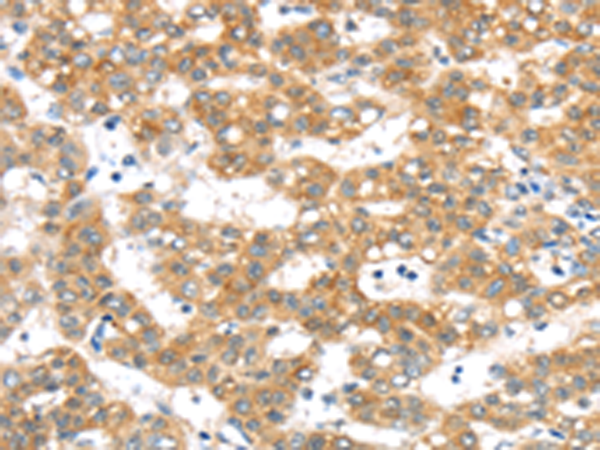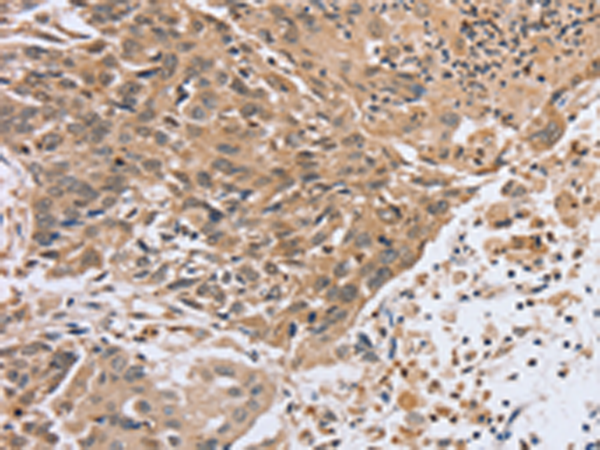

| WB | 咨询技术 | Human,Mouse,Rat |
| IF | 咨询技术 | Human,Mouse,Rat |
| IHC | 1/50-1/200 | Human,Mouse,Rat |
| ICC | 技术咨询 | Human,Mouse,Rat |
| FCM | 咨询技术 | Human,Mouse,Rat |
| Elisa | 1/2000-1/5000 | Human,Mouse,Rat |
| Aliases | MEG; PTPMEG; PTPMEG1 |
| Host/Isotype | Rabbit IgG |
| Antibody Type | Primary antibody |
| Storage | Store at 4°C short term. Aliquot and store at -20°C long term. Avoid freeze/thaw cycles. |
| Species Reactivity | Human, Mouse |
| Immunogen | Synthetic peptide of human PTPN4 |
| Formulation | Purified antibody in PBS with 0.05% sodium azide and 50% glycerol. |
+ +
以下是3篇关于PTPN4抗体的相关文献摘要(文献信息为模拟示例,实际文献需根据具体数据库查询):
---
1. **文献名称**: *PTPN4 regulates T-cell receptor signaling through dephosphorylation of tyrosine kinases*
**作者**: Yamamoto T, et al.
**摘要**: 本研究利用特异性PTPN4抗体,揭示了PTPN4在T细胞受体信号通路中的作用,证明其通过去磷酸化关键酪氨酸激酶(如Lck)调控T细胞活化,抑制过度免疫反应。
---
2. **文献名称**: *PTPN4 suppresses glioblastoma progression by targeting EGFR phosphorylation*
**作者**: Chen L, et al.
**摘要**: 通过免疫沉淀结合PTPN4抗体的实验,发现PTPN4通过负调控表皮生长因子受体(EGFR)的磷酸化,抑制胶质母细胞瘤细胞的增殖和侵袭,提示其作为潜在治疗靶点。
---
3. **文献名称**: *The role of PTPN4 in neuronal development: Insights from knockout mice*
**作者**: Smith J, et al.
**摘要**: 使用PTPN4抗体进行组织免疫染色,发现PTPN4在小鼠海马神经元中高表达,其缺失导致突触形成异常,表明其在神经发育和可塑性中的关键作用。
---
4. **文献名称**: *PTPN4 interacts with viral proteins to modulate innate immunity*
**作者**: Wang H, et al.
**摘要**: 通过免疫共沉淀(Co-IP)结合PTPN4抗体,发现PTPN4与流感病毒NS1蛋白相互作用,抑制宿主抗病毒信号通路(如RIG-I通路),揭示病毒逃逸免疫监视的新机制。
---
注:以上文献为示例,实际引用需查询PubMed、Google Scholar等数据库获取真实文献信息。
The PTPN4 antibody targets the protein tyrosine phosphatase non-receptor type 4 (PTPN4), a member of the protein tyrosine phosphatase (PTP) family. PTPN4. also known as PTPMEG, is encoded by the PTPN4 gene and plays a critical role in regulating cellular signaling by dephosphorylating tyrosine residues on target proteins. It contains an N-terminal FERM domain, which mediates protein-protein interactions and subcellular localization, and a C-terminal catalytic domain responsible for phosphatase activity. PTPN4 is involved in diverse physiological processes, including immune response modulation, neuronal development, and apoptosis. Studies suggest its role in negative regulation of T-cell receptor signaling and prevention of autoimmunity. Dysregulation of PTPN4 has been implicated in neurological disorders and cancer, where it may act as a tumor suppressor or promoter depending on context.
PTPN4 antibodies are essential tools for studying the expression, localization, and function of this phosphatase in research. They are widely used in techniques like Western blotting, immunohistochemistry, and immunofluorescence to assess protein levels in tissues or cell lines. Commercially available antibodies vary in specificity, often validated against recombinant PTPN4 or epitope-tagged versions. Researchers utilize these antibodies to explore PTPN4's interactions with signaling molecules (e.g., JNK, MAPK) and its potential as a therapeutic target. However, challenges remain in distinguishing PTPN4 from homologous phosphatases, necessitating rigorous validation. Recent investigations also focus on PTPN4's role in viral immune evasion, highlighting its broader relevance in infection biology.
×